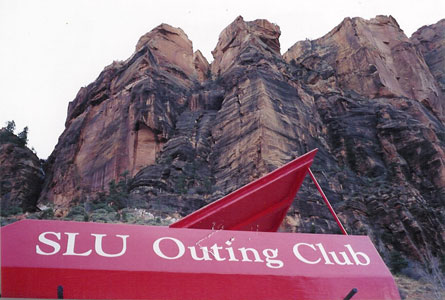The happy-go-lucky world of outdoor sports and outdoor education at St. Lawrence has an alarm ing lack of diversity, and I am part of the problem. For the past century and beyond, the world of outdoor exploration and adventuring has been dominated by white, European, able-bodied men who have gone out into the world with the mission of discovering, “conquering,” and recording the world’s many non-western wilderness places. This exploration syndrome manifests itself as the competitive need to have the “first recorded” ascent of a mountain, the deepest dive, the most miles run in the fastest time, etc.
Now I am not arguing against competition. Rather I am looking at SLU’s Outdoor Program and Club in the context of the greater outdoor population and realizing that we are (with few exceptions) a racially segregated community. And I think it is high time to start a serious discussion about why this is occurring and what the Outdoor Program here at SLU can do to encourage and help people from all walks of life access and enjoy the great outdoors.
There are several potential reasons for why the faces of most of outdoor athletes tend to be both white and male. Could one of those reasons be the intentional exclusion of certain groups from accessing our nation’s many wild places? I would hope not, but if so it is imperative for us as fellow citizens to demand an immediate end to what I would deem as both immoral and illegal exclusion.
An alternate, and what I think might be a more likely reason for the visible lack of outdoor diversity across America and here at SLU, would be the lack of social and economic incentives for people of color to get comfortable being outside and learning more about enjoying the outdoors. I have had many instructors who looked and sounded just like me throughout my life. Their help and encouragement as they exposed me to a wild world of beautiful and extreme terrain certainly kept me stoked on learning basic principles of weather proofing, Leave No Trace camping, and layering, while also teaching me far more complex hard skills like rolling a kayak, climbing on lead, and making killer turns on skis while tearing down a steep mogul-ridden mountain.
All of this outdoor education was expensive, but I would argue that the social side of this diversity problem better explains why when I go to many of our national parks I see an overwhelming number of Caucasian faces.
Recently, I have seen a surge in females crushing it in the outdoors. The St. Lawrence Outdoor Program and Outing Club do deserve credit for breaking some (but not all) ground on gender. I believe that while fighting for gender equality in the outdoor community, more has to be done to encourage the diversity of outdoor leaders of African, Asian, Latin, and Indigenous decent. Our own University president, Dr. Fox, said in his Martin Luther King Jr. Day email: “At St. Lawrence diversity is no longer a topic of easy relevance that can wait, even with a new graduation requirement of coursework still evolving, but rather, a culture of both diversity and inclusivity must become the preeminent norm on our campus.” Clearly our Outdoor Program is an integral part of campus life.
Now we must pose the question: How can we as an outdoor department foster an environment of diversity and inclusivity? I acknowledge my own shortcomings when it comes to answering this question. I am a Caucasian male with more opportunity and resources available to me than most. Certainly the answer cannot come from me for I am not at all in the ethical position to do so. However, I feel as though I can offer a couple of feasible options that SLU can easily pursue. The first most obvious option would be to press for the hiring of a highly qualified female professor of color to the Outdoor Program. A leader like this within the department would attract a broader range of students to participate in Outdoor Program classes, and add credibility to SLU’s mission of diversity.
Another option would be to encourage members of the Higher Education Opportunity Program (HEOP) to take Outdoor Program classes and encourage them to apply to SLU Outdoor Program’s spring guide training class. An increase in the diversity of races and backgrounds of SLU Outdoor Program student guides is certainly welcome and overdue.
I’ve noticed this problem and I hope I have addressed it adequately enough. The floor is open, and I hope to hear more opinions going forward. More so, I hope to see St. Lawrence’s Outdoor Program become a leader in creating outdoor leaders from all races, genders, ethnicities, and financial backgrounds. The days of racial and gender exclusivity are no longer acceptable, and it behooves all of us to make a greater effort to promote inclusivity and diversity throughout all aspects of our life.
Get real time updates directly on you device, subscribe now.
Prev Post
Next Post



